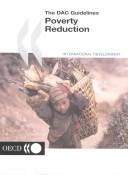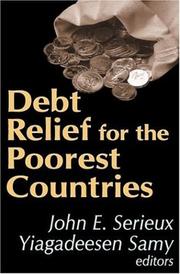| Listing 1 - 10 of 67 | << page >> |
Sort by
|
Book
ISBN: 9780230248915 0230248918 Year: 2013 Publisher: New York: Palgrave MacMillan,
Abstract | Keywords | Export | Availability | Bookmark
 Loading...
Loading...Choose an application
- Reference Manager
- EndNote
- RefWorks (Direct export to RefWorks)
Social policy --- Thailand --- Vietnam --- Poverty --- Poor --- Poverty - Developing countries --- Poor - Developing countries --- Poverty - Thailand --- Poverty - Vietnam

ISBN: 1280083530 9786610083534 9264194770 9264195068 Year: 2001 Publisher: Paris : OECD Publishing,
Abstract | Keywords | Export | Availability | Bookmark
 Loading...
Loading...Choose an application
- Reference Manager
- EndNote
- RefWorks (Direct export to RefWorks)
Developing countries, with the support of multilateral institutions, the bilateral development assistance community and civil society organisations, are focusing as never before on the development priority of reducing poverty by half by 2015. Country-led and country-owned poverty reduction strategies focusing on local needs and priorities as determined by stakeholders are now the focus of all development assistance efforts. The DAC Guidelines on Poverty Reduction provide practical information about the nature of poverty and best practice approaches, policies, instruments and channels for tackling it. They also break new ground in setting out the parameters for building effective partnerships with governments, civil society, and other development actors, and in describing how institutional change and development within bilateral agencies themselves could be undertaken for mainstreaming poverty reduction, partnership and policy coherence.
Book
ISBN: 9221170209 9221170217 Year: 2005 Publisher: Geneva : ILO Publications,
Abstract | Keywords | Export | Availability | Bookmark
 Loading...
Loading...Choose an application
- Reference Manager
- EndNote
- RefWorks (Direct export to RefWorks)
Concentrates on sub-Saharan Africa and more particularly on its large majority of poor people working in the informal economy. Examines the evidence that supports the commonly accepted hypothesis that social health protection contributes to poverty reduction and economic growth.
Book
ISBN: 1409428737 9786613933232 1409428745 1283620782 1317142594 9781409428749 9781409428732 9781283620789 9781409460480 1409460487 9781315579917 9781317142584 9781317142591 9781138108998 1317142608 131557991X Year: 2012 Publisher: Burlington, Vt. : Gower,
Abstract | Keywords | Export | Availability | Bookmark
 Loading...
Loading...Choose an application
- Reference Manager
- EndNote
- RefWorks (Direct export to RefWorks)
Entrepreneurship and Sustainability challenges the notion that not-for-profit social entrepreneurship is the only sort that can lead to the alleviation of poverty. It explores how best to bring commercial investors together with those who are best placed to reach the poorest customers. With case studies from around the World, the focus of the contributions is on the new breed of entrepreneurs who are blending a profit motive with a desire to make a difference in their communities and beyond borders. A significant number of the contributions here also recognize that although much research has b
Poverty -- Developing countries -- Case studies. --- Poverty -- Developing countries. --- Social entrepreneurship -- Case studies. --- Social entrepreneurship. --- Social entrepreneurship --- Poverty --- Management --- Business & Economics --- Management Styles & Communication --- Destitution --- Wealth --- Basic needs --- Begging --- Poor --- Subsistence economy --- Entrepreneurship --- E-books
Book
ISBN: 9264168354 9264168346 Year: 2012 Publisher: [Paris] : OECD,
Abstract | Keywords | Export | Availability | Bookmark
 Loading...
Loading...Choose an application
- Reference Manager
- EndNote
- RefWorks (Direct export to RefWorks)
Empowerment of those living in poverty is both a critical driver and an important measure of poverty reduction. It is the decisions and actions of poor people themselves that will bring about sustainable improvements in their lives and livelihoods. Inequitable power relations exclude poor people from decision-making and prevent them from taking action. Sustainable poverty reduction needs poor people to be both the agents and beneficiaries of economic growth - to directly participate in, contribute to and benefit from growth processes. Strengthening poor people’s organizations, providing them with more control over assets and promoting their influence in economic governance will improve the terms on which they engage in markets. This economic empowerment combined with political and social empowerment will make growth much more effective in reducing poverty. This report aims to build donor understanding of empowerment and how best to support it.

ISBN: 9781138509009 9780765801616 0765801612 Year: 2003 Publisher: London: Transaction,
Abstract | Keywords | Export | Availability | Bookmark
 Loading...
Loading...Choose an application
- Reference Manager
- EndNote
- RefWorks (Direct export to RefWorks)
Book
ISBN: 9221219968 9789221219965 Year: 2009 Publisher: Geneva : International Labour Office, Palgrave Macmillan,
Abstract | Keywords | Export | Availability | Bookmark
 Loading...
Loading...Choose an application
- Reference Manager
- EndNote
- RefWorks (Direct export to RefWorks)
This book makes the case for a comprehensive social security system to be developed in all countries, including the poorest ones, in order to eliminate desperate conditions of poverty, to reverse growing inequality and to sustain economic growth. This is a co-publication with Palgrave Macmillan
Book
ISBN: 9221194736 Year: 2007 Publisher: Geneva : ILO Publications,
Abstract | Keywords | Export | Availability | Bookmark
 Loading...
Loading...Choose an application
- Reference Manager
- EndNote
- RefWorks (Direct export to RefWorks)
Traces the historical experience in developed and developing countries of putting into practice rights to social security, including social insurance, and an adequate standard of living. Outlines three distinct forms of models for welfare states: the Nordic or Social Democratic model (Scandinavia), the Corporatist model (Germany), and the Liberal or Residual model (UK and USA).
Book
ISBN: 9221181995 9221182002 Year: 2006 Publisher: Geneva, Switzerland : International Labour Organization,
Abstract | Keywords | Export | Availability | Bookmark
 Loading...
Loading...Choose an application
- Reference Manager
- EndNote
- RefWorks (Direct export to RefWorks)
Discusses small enterprise development and private sector development as key methods for alleviating poverty.

ISBN: 0198288638 9780198288633 Year: 1996 Publisher: Oxford: Clarendon,
Abstract | Keywords | Export | Availability | Bookmark
 Loading...
Loading...Choose an application
- Reference Manager
- EndNote
- RefWorks (Direct export to RefWorks)
| Listing 1 - 10 of 67 | << page >> |
Sort by
|

 Search
Search Feedback
Feedback About UniCat
About UniCat  Help
Help News
News